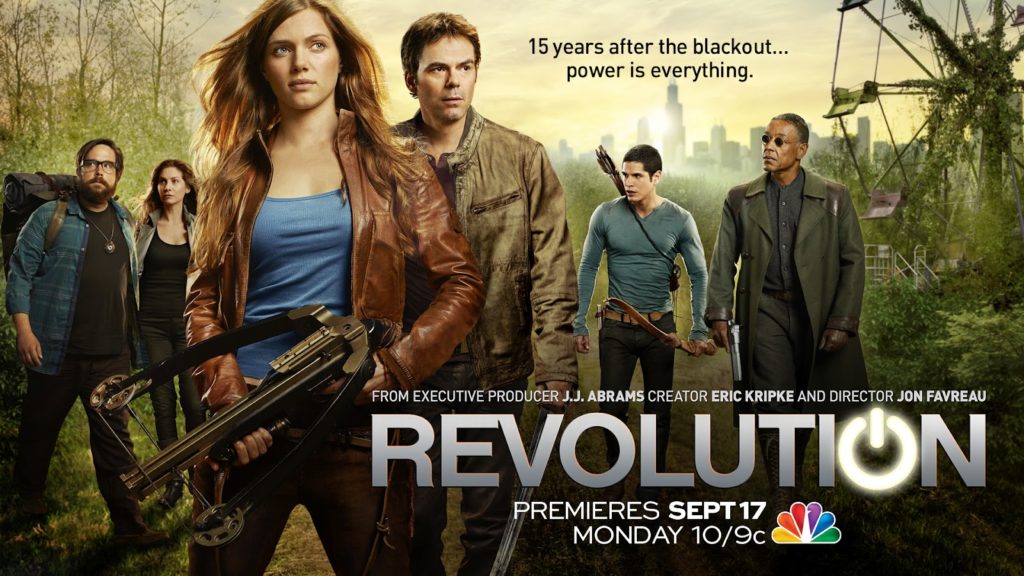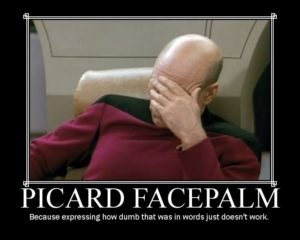So You Say You Want A Revolution?
So here we are, folks. We’re about a month into the new fall schedule on TV. And I have to admit, my viewing habits haven’t changed that much. I’m still a diehard Castle fan (although I temper that by reading Lee Lofland’s insightful reviews after every episode). I have a regular Sunday night TV watching date with my wife to see who the latest team to be eliminated from The Amazing Race is (Go rockers!). And I still indulge in my guilty pleasure, namely America’s Next Top Model. Go ahead and leave my well-deserved mockery in the comments below.
 But I did decide to add a new show to my repertoire, namely NBC’s Revolution. Maybe it’s because I’ve become a dystopian junky in the last year or so. Maybe I wanted to see if this would turn out to be a Hunger Games knock-off. At any rate, I’ve been watching the first few episodes with . . . well, tepid interest might be the best way to describe it. My socks have not been blown off yet. I’m not exactly emotionally invested in the characters. The one thing that keeps me coming back is the mystery over why the power went out. At first, I thought it would turn out to be an EMP, but the facts aren’t backing up that theory right now. If that question ever gets answered, that might be my last episode. We’ll see.
But I did decide to add a new show to my repertoire, namely NBC’s Revolution. Maybe it’s because I’ve become a dystopian junky in the last year or so. Maybe I wanted to see if this would turn out to be a Hunger Games knock-off. At any rate, I’ve been watching the first few episodes with . . . well, tepid interest might be the best way to describe it. My socks have not been blown off yet. I’m not exactly emotionally invested in the characters. The one thing that keeps me coming back is the mystery over why the power went out. At first, I thought it would turn out to be an EMP, but the facts aren’t backing up that theory right now. If that question ever gets answered, that might be my last episode. We’ll see.
And yet, there are some things that are poking at my thoughts and mind. One of the characters has kind of caught my attention and has been stirring my thoughts. But before I share those, I wanted to talk about one thing that happened a few weeks ago. If you haven’t seen the show, don’t worry, it’s not all that spoiler-y.
Let’s get caught up, though. Something has shut off all the power in the world. As a result, civilization has pretty much collapsed. At one point, the characters are traveling through a larger community and they happen to pass by Hollywood Christian Cliche #126, the fire-and-brimstone street preacher. Some dude was standing on a crate and spouting off about how God sent the blackout to punish everyone for their many sins.
This infographic sums up my reaction when I heard that:
Now I get why they did that. There would undoubtedly be some Christians who would react to a massive disaster like that. After all, in recent years, we’ve heard a certain Christian pundit spout off about how Haiti asked for the earthquake that killed so many people and how “the gays cause hurricanes.” It makes me wonder how many people have the pages of Luke 13 in their Bibles stuck together.
Let’s take a peek at Luke 13 for a moment:
Now there were some present at that time who told Jesus about the Galileans whose blood Pilate had mixed with their sacrifices. Jesus answered, “Do you think that these Galileans were worse sinners than all the other Galileans because they suffered this way? I tell you, no! But unless you repent, you too will all perish. Or those eighteen who died when the tower in Siloam fell on them—do you think they were more guilty than all the others living in Jerusalem? I tell you, no! But unless you repent, you too will all perish.” Luke 13:1-5 (NIV)
Here Jesus talks about two big disasters in His day. The first is a group of Galilean pilgrims who get killed at some point. Sadly, we don’t have any references aside from this that might explain what happened. We do know from the historical records that the Galileans tended to have more than their fair share of revolutionaries and troublemakers in their midst, so it’s entirely possible that some of those revolutionaries did something that caused the Romans to kill them.
What I find interesting is what Jesus had to say about their deaths. Were they worse sinners than everyone else? Not at all. The same thing is true for the tower in Siloam. Were they worse sinners than everyone else? Once again, Jesus says they weren’t.
What’s lurking behind these questions is the rather common belief that God zaps sinners. We do something wrong and BANG! We get hit with something to punish us. It’s a very karmic view of the universe and it creeps into everyone’s thoughts from time to time. But by asking and answering these questions, Jesus is pointing out that God doesn’t work like that. He doesn’t reserve horrific punishments in the here and now for the worst offenders. God doesn’t work like that. So would God send a fictional blackout to punish a group of horrible sinners? Nope. Did He send the earthquake or the hurricanes to punish the worst of sinners? I would hope not, or He’d be sending much worse after me. And after you too, don’t fool yourself.
So where do these bad things come from? They come from sin. People do bad things to one another because they are sinners. Bad stuff happens in this world (like collapsing towers, earthquakes, hurricanes, and so on) because we live in a world broken by sin.
And that’s why Jesus adds a call to repent after each answer. He’s not calling for repentance so that people can avoid the bad things that happen in this world. Instead, it’s His way of saying, “In this world, you face danger at every turn. You need Me.” God doesn’t cause the disasters, but I think He uses them to get our attention and get us to come back to Him.
So what do you think? Let me know in the comments.








































“In this world you will have trouble, but take heart–I have overcome the world.” Jesus said it all right there.
That said, the narrow-minded fire-and-brimstone types do exist, even though they’ve made a mockery of Christianity. In fact, that’s one of the few stereotypes Hollywood is allowed to use anymore (that and Men Are Fat Lousy Slimeballs Who Watch Football).
I just ran across a YA series I’m dying to pick up, called Ashfall. It’s a series about what would happen if the Yellowstone supervolcano erupted, and two teens are trying to travel across the (rapidly falling-apart) country to locate their parents. I have a feeling that a scenario like that might be more believable than “omg the lights went out”. (Besides, there’s nothing more terrifying than the solemn geological reports about Yellowstone and Mammoth Mountain. Dormant, not extinct.)
Well, you know, the Bible says that, to God, sin is sin. “Levels” of sin are a manmade concept. If God were going to send natural disasters to zap sinners, He’d have to re-create The Flood, which He promised not to do. Like you said, though, I’m sure He’s not above using them to get our attention.
I’ve been watching Revolution as well, but only with mild curiosity. It hasn’t held my attention like I’d hoped it would. In fact, I fall asleep most nights about halfway through. hehehe…
The concept of “levels” or different degrees of sinful wickedness comes from Christ:
I believe other Biblical evidences exist for that concept. It’s a relatively minor issue — but it could be a way we understand God’s character, knowing He does not punish every one with the same severity, but instead renders according to people’s deeds (cf Romans 2:6).
Dante later extrapolated this into the wholly imaginative idea of “circles” of Hell, and of course Shepherd Book extrapolated this further into the idea of a special Hell, for those who molest children, abuse women or talk loudly at the theater.